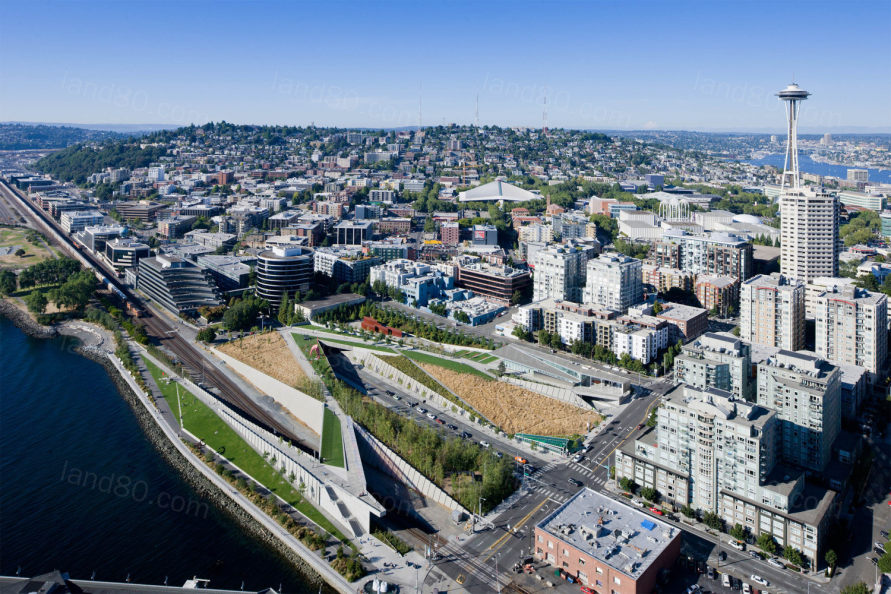项目被设想为雕塑公园的新城市模式,位于西雅图最后一个未开发的海滨地产:一个被火车轨道和一条主干道分割的工业棕地。该设计通过一个不间断的Z形绿色平台将三个独立的地点连接起来,该平台从城市下降40英尺到水中,利用天际线和埃利奥特湾的景观,并在现有基础设施之上拔地而起,将城市核心连接到重新焕发活力的滨海空间。
Envisioned as a new urban model for sculpture parks, this project is located on Seattle’s last undeveloped waterfront property – an industrial brownfield site sliced by train tracks and an arterial road. The design connects three separate sites with an uninterrupted Z-shaped green platform that descends forty feet from the city to the water, capitalizes on views of the skyline and Elliott Bay, and rises over existing infrastructure to reconnect the urban core to the revitalized waterfront.

©Iwan Baan

©Iwan Baan

©Benjamin Benschneider
该地点以前归加州联合石油公司(Unocal)所有,以前曾被用作石油转运设施。在公园建设之前,超过12万吨的污染土壤被清除。剩下的石油污染土壤被一种新的地貌覆盖,项目使用了超过20万立方码的填充土,其中大部分是从西雅图艺术博物馆的市中心扩建项目中挖掘出来的。
Formerly owned by Union Oil of California (Unocal), the site was previously used as an oil transfer facility. Before the park’s construction, over 120,000 tons of contaminated soil were removed. The remaining petroleum contaminated soil is capped by a new landform with over 200,000 cubic yards of clean fill, much of it excavated from the Seattle Art Museum’s downtown expansion project.

©Paul Warchol
项目是一次国际设计竞标的胜利,它利用了从场地顶部到水边40英尺的坡度变化,为一个从城市到海岸线的破碎空间创造了连续的景观,同时提供了一个新的步行基础设施。增强的地貌由机械稳定的土壤系统建造,当它穿过高速公路和火车轨道与城市相遇时,重建了遗址的原始地形。该方案覆盖了现有的场地和基础设施,创建了一个动态链接。主要的步行道始于一个1.8万平方英尺的展馆,随着每段小路向下延伸,可以看到截然不同的景色。第一段横跨高速公路,可以看到奥林匹克山脉的景色;第二段横跨铁轨,可以看到城市和港口的景色;最后一段下降到水中,可以看到新创建的海滩的景色。这种步行地貌允许在城市中心和修复后的海滨海滩之间自由活动。
Winner of an international design competition, the design for the Olympic Sculpture Park capitalizes on the forty-foot grade change from the top of the site to the water’s edge. Planned as a continuous landscape that wanders from the city to the shoreline, this Z-shaped hybrid landform provides a new pedestrian infrastructure. Built with a system of mechanically stabilized earth, the enhanced landform reestablishes the original topography of the site as it crosses the highway and train tracks and descends to meet the city. Layered over the existing site and infrastructure, the scheme creates a dynamic link that makes the waterfront accessible. The main pedestrian route begins at an 18,000-square-foot exhibition pavilion and descends as each leg of the path opens to radically different views. The first stretch crosses a highway, offering views of the Olympic Mountains; the second crosses the train tracks, offering views of the city and port; and the last descends to the water, revealing views of the newly created beach. This pedestrian landform allows free movement between the city’s urban center and the restored beaches on the waterfront.

©Benjamin Benschneider

©Paul Warchol

©Paul Warchol
当步道从展馆下降到水面时,它连接了三个截然不同的环境:茂密而温带的常绿森林;具有季节性变化特征的落叶林;以及包括一系列新的潮汐梯田的海岸线花园,用于鲑鱼栖息地和咸水植被。在整个公园中,地貌和植物相互协作,引导、收集和清理雨水,使其在流经场地后排入埃利奥特湾(Elliott Bay)。
As the route descends from the pavilion to the water, it links three distinct settings: a dense and temperate evergreen forest; a deciduous forest of seasonally changing characteristics; and a shoreline garden including a series of new tidal terraces for salmon habitat and saltwater vegetation. Throughout the park, landforms and plantings collaborate to direct, collect, and cleanse storm water as it moves through the site before being discharged into Elliott Bay.

©Paul Warchol
奥林匹克雕塑公园作为“艺术景观”,定义了博物馆墙外现当代艺术的新体验。公园地形多变,为多种尺度的雕塑提供了多样化的环境。故意开放的设计吸引了对艺术和环境参与的新解释,重新连接了艺术、景观和城市生活之间支离破碎的关系。
As a “landscape for art,” the Olympic Sculpture Park defines a new experience for modern and contemporary art outside the museum walls. The topographically varied park provides diverse settings for sculpture of multiple scales. Deliberately open-ended, the design invites new interpretations of art and environmental engagement, reconnecting the fractured relationships of art, landscape, and urban life.

©Benjamin Benschneider
项目名称:OLYMPIC SCULPTURE PARK
设计单位:WEISS/MANFREDI
项目周期:2001-2007年
项目客户:西雅图美术馆
设计团队:Marion Weiss和Michael A.Manfredi(设计合作伙伴),Christopher Ballentine(项目经理),Todd Hoehn和Yehre Suh(项目建筑师),Patrick Armacost,Michael Blasberg,Beatrice Eleazar,Hamilton Hadden,Mike Harshman,Mustapha Jundi,John Peek, Lauren Crahan,Kian Goh,Justin Kwok,Lee Lim和Yehre Suh,
结构与土木工程:Magnusson Klemencic Associates
机电工程:ABACUS Engineered Systems
照明设计:Brandston Partnership Inc.
岩土工程:Hart Crowser
环境工程:Aspect Consulting
水上工程:Anchor Environmental
图案顾问:Pentagram
安全顾问:ARUP
餐饮服务:Bon Appetit
厨房:JLR设计
零售:Doyle + Associates
建筑工地代表:Owens Richards Architects,pllc
项目管理:Barrientos LLC
总承包商:Sellen Construction
Dates: 2001-2007
Client: Seattle Art Museum
Competition Winner: WEISS/MANFREDI Architecture/Landscape/Urbanism
Site Design / Architecture: WEISS/MANFREDI Architecture/Landscape/Urbanism
Marion Weiss and Michael A. Manfredi (Design Partners), Christopher Ballentine (Project Manager), Todd Hoehn and Yehre Suh (Project Architects), Patrick Armacost, Michael Blasberg, Beatrice Eleazar, Hamilton Hadden, Mike Harshman, Mustapha Jundi, John Peek, and Akari Takebayashi. Competition and Exhibition team: Lauren Crahan, Kian Goh, Justin Kwok, Lee Lim and Yehre Suh,
Consultant Team
Structural and Civil Engineering: Magnusson Klemencic Associates
Mechanical and Electrical Engineering: ABACUS Engineered Systems
Lighting Design: Brandston Partnership Inc.
Geotechnical Engineering: Hart Crowser
Environmental: Aspect Consulting
Aquatic Engineering: Anchor Environmental
Graphics: Pentagram
Security and AV/IT: ARUP
Catering & Food Service: Bon Appetit
Kitchen: JLR Design
Retail: Doyle + Associates
Architectural Site Representation: Owens Richards Architects, pllc
Project Management: Barrientos LLC
General Contractor: Sellen Construction
|